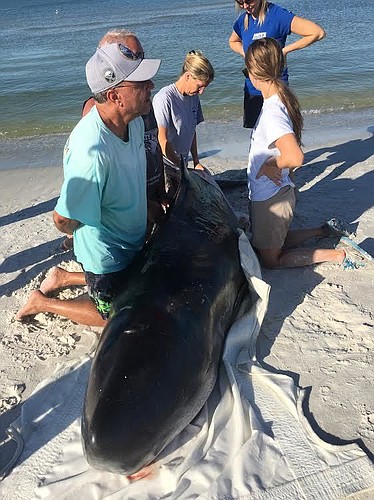- April 18, 2024
-
-
Loading

Loading

On Tuesday morning, Mote Marine Laboratory responded to a report of a stranded whale on Longboat Key. Wildlife officials were forced to euthanize the marine mammal that appeared to be suffering from severe shark bites.
The animal is either a pygmy or dwarf sperm whale. The species are related and can be difficult to tell apart in the field. They are usually found in tropical to temperate waters, usually offshore in water deeper than the shallower habitats around Longboat. Full details of the whale’s stranding were not available by press time Tuesday afternoon, but upon examination, the whale appeared to be underweight and suffering from shark bites, including one that pierced its body cavity, according to a statement from Mote.
Mote’s veterinary staff kept the whale as comfortable as possible while working with the National Oceanic and Atmospheric Administration’s National Marine Fisheries Services (NMFS), which monitors the wild populations of dolphins and whales.
Following examination, those involved found that the most humane decision was to euthanize the whale. The animal was severely injured and deemed highly unlikely to respond to care, Mote’s statement said.
Under NMFS approval, the euthanization was carried out on the beach. The carcass was then transported to the Marine Mammal Pathobiology Lab of the Florida Fish and Wildlife Conservation Commission’s Fish and Wildlife Research Institute (FWRI) in St. Petersburg. The staff there has begun a necropsy to better understand the whale’s condition.
Mote’s goal is to rescue, rehabilitate and return animals to the wild when possible.
Mote’s statement said that while it’s unfortunate when an animal cannot be returned to its natural habitat, it’s critical to learn as much as possible from each deceased animal.
Mote reminds members of the public that if they see a stranded marine mammal or sea turtle, alive or not, they should not push it back into the water. Anyone who sees a stranded animal should call 988-0212. If an animal is found outside of Sarasota or Manatee counties, call the FWC Wildlife Alert Hotline at 1-888-404-FWCC.